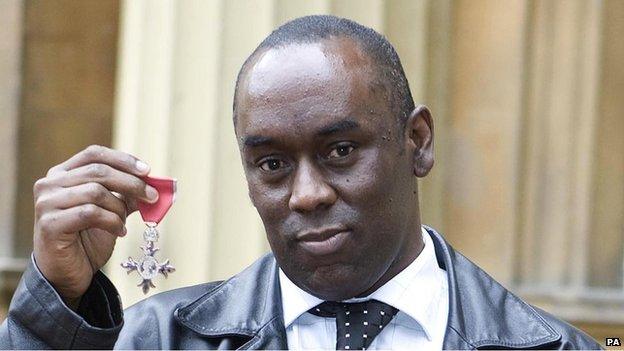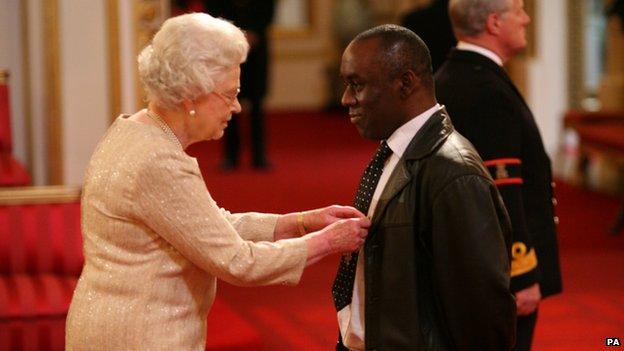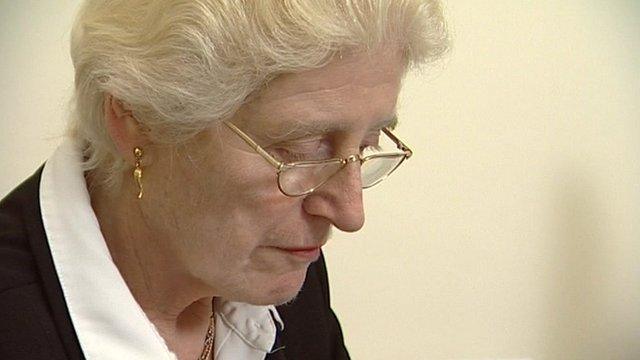Author Alex Wheatle: 'Systematic abuse where I grew up'
- Published

Alex Wheatle said many victims of abuse have "stories that they want to tell"
The only records of historical child abuse that can be used to prosecute paedophiles lie in the memories of abused children, a victim has said.
Author Alex Wheatle said he was abused at a south London children's home where he lived from 1966 until 1978.
There was "systematic" physical, sexual and emotional abuse there, he said.
Mr Wheatle, who was appointed MBE in 2008, external, told the BBC few paper records would exist so victims must be made to feel "confident" to come forward.
He said he had addressed issues of abuse in his novels, but now aged 51 he had decided to speak publicly about the abuse he suffered at Shirley Oaks children's home.
"I have spoken about violence before but not the sexual assault," he said
'Need a voice'
The government has recently announced two inquiries into historical child sex abuse allegations, one of which will examine how state institutions handled their duty of care to protect children from paedophiles.
Mr Wheatle said it would be "very difficult" for any inquiry to uncover abuse years after the crimes happened.
"It really comes down to the people who suffered," he said.
"I hope people come forward, but people will only come forward if they feel confident they will be listened to."
He said high-profile abuse cases like that of Jimmy Savile had made victims feel a "need" to speak out.
"I know many people who have stories that they want to tell and who feel they have not been acknowledged for what they went through," he said.
"We need a voice, we need to be listened to, we need to be acknowledged by the state."

Mr Wheatle was appointed MBE for services to literature in 2008
He recalled being beaten at Shirley Oaks and said the children there suffered "all sorts of abuses".
"In the cottage where I was it was systematic," he said.
"It was on a daily basis."
Mr Wheatle said on one occasion he was sent to a doctor who told him to strip naked and then sexually assaulted him.
He also recalled one child being "taken away" for complaining. When she came back months later she was "traumatised" and refused to talk about what had happened to her, he said.
He said "strange men" were often in the grounds of the home, and some of these would "target" the children.
'Living in cottage'
Mr Wheatle said there been an "utter failure" by social services to protect children, adding: "They knew what was going on but they let it go."
Shirley Oaks closed in 1995 and three years later the Metropolitan Police and Lambeth Council, which ran the home, started Operation Middleton, external - a joint investigation into abuse at homes controlled by the council.
Three people were jailed as a result of the investigation, and it found 16 alleged perpetrators had died and 19 "could not be identified".
But Mr Wheatle said the investigation did not properly examine "why these people had access to children".
"I hope these new inquiries look into that," he said.
"The guy who abused one of the children was living in a cottage [where the children lived] on a fold-up bed. How did that happen?"
A Lambeth Council spokeswoman said it would "co-operate fully" with the government inquiries.
"We are also supporting ongoing police enquiries and would urge anyone with new information to contact Lambeth Council or the police," she added.
'Demons' released
Speaking about the effects of abuse, Mr Wheatle said: "You are a child so you have no understanding of why you suffer it.
"You just live in fear all the time. You are just trying to survive."
He said each child had their own way of "dealing with" abuse.
"I was very lucky because I found writing," he said.
"I felt that released some of the demons that had tortured me.
"I address these feelings in two or three of my novels.
"Some people who can't find that release end up on drink, drugs or whatever."
Chief Constable Simon Bailey, the police's national lead officer for child protection and abuse investigations, said: "Almost without exception police forces are seeing significant increases in child sexual abuse investigations.
"We do not believe that more offences are being committed but rather victims are becoming increasingly confident that they are going to be believed and that police are now dealing with such complaints in a very professional and sympathetic manner."
- Published14 July 2014

- Published4 February 2015

- Published9 July 2014

- Published4 February 2015
